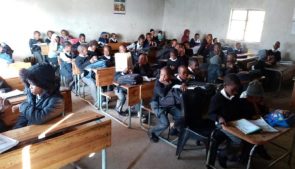The Basic Education Department has blamed its failure to provide meals to over 9 million learners nationwide on logistics and lack of infrastructure.
Equal Education approached the Pretoria High Court on an urgent basis to seek an order to compel the government to provide meals to learners, regardless of whether they have returned to school or not.
The programme which feeds 9 million learners was suspended in March due to the lockdown. It resumed on 8 June when schools reopened, but Equal Education says 7.5 million children did not receive meals on June 8, and close to 4 million are still deprived of meals despite the programme being fully funded.
Millions of South African children depend on the schools’ nutrition programme for one meal a day. The suspension of the programme as a result of the lockdown has left many children without food.
The government promised to continue feeding these learners during the lockdown, but according to Equal Education, only a handful has received daily meals.
With no guarantee from the department on when the programme will be back in full swing, the organisation is seeking declaratory relief and supervisory orders against the education minister.
Arguing for the organisation, Advocate Thembeka Ngcukaitobi, says the government has stripped the dignity of these poor learners by depriving them of their constitutional right to access nutrition.
“We are not asking for additional rights, we are not asking for additional expansions. But what we are asking from your ladyship is to simply respect the existing access of the right. So the existing access was that nine million children were receiving the meal a day, that cannot be discontinued by the state nor can it be postponed. The rights in Section 72 make it clear that if you are already a recipient of a right that is provided for in the constitution, it may not be discontinued.”
Logistics
The Education Department has blamed the failure to fulfil its promise on the challenges posed by the lockdown. It argues that the nutrition programme was built around the availability of infrastructure at schools. It says meals have to be delivered and supplied to learners back at school and those who are not at school pose a huge challenge.
“It wasn’t simply a case of okay, 8 June, schools re-open and now it is business as usual. The inherent restraint in the programme was that to roll it out, you use the infrastructure at schools. Now if that infrastructure had to be supplemented, if we had to get extra delivery vehicles, if we had to get drivers, that doesn’t happen overnight, there was an economic implication. Even the private sector that normally supported us had a problem because of the economic crisis that was made available. There was a logistical problem even for the Department of Social Development during the lockdown,” says the department’s legal representative, Advocate Marius Oosthuizen.
Impact on learners
Meanwhile, in Limpopo, some high school learners at Rotterdam village outside Giyani, say they depended on the meals they receive from the school feeding scheme and it has been tough for them since the lockdown.
“I wish they had never stopped feeding us at school because some of us come from poor families. Sometimes it’s very hard for my family to even afford maize meal… I believe they should continue cooking for us because we depend on the meals from school, at home I can spend the whole day without eating. Please feed us, even if we are not attending classes,” says one of the learners.
Judgment has been reserved.






